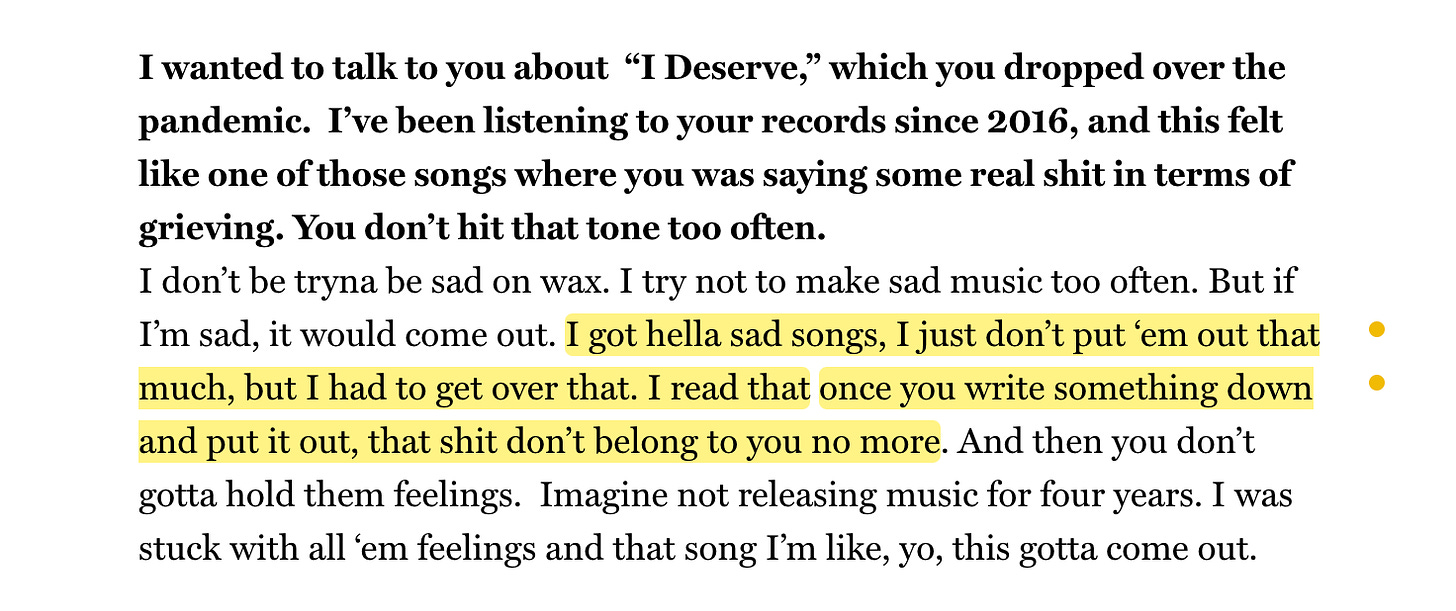It has been interesting watching myself continually avoid things I know I need to do —that I want to do!—which take considerable activation energy to complete. This is nothing new: I’ve written before about how hard things are hard to do, or that flow state is preceded by resistance. But I have always taken pride in my ability to conquer the task, to attack the problem, to get after it—whatever the “it” of the moment is.
So: why have I been so avoidant lately? Even though I occasionally succumb to the attention-scattered-nature my generation is notorious for, it’s quite uncharacteristic for me to flat out avoid my most important task for so many days in a row (these days, that task is usually writing 1,000 words). Something feels different this time. This isn’t a lack of discipline or a symptom of scattered focus. It appears as though the nature of the block I’m experiencing has fundamentally shifted.
In a fit of further procrastination, I found myself reading this bookbear essay about psychological blocks, with my attention snagging on this bit:
“If you’re feeling blocked, I’d try to figure out whether you’re a) afraid of something either tangible or nebulous or b) feeling majorly misaligned with what you’re doing. Sometimes it’s a) and b) at the same time.”
For a while I was blocked because I had a huge bucket of (b) tasks sitting in front of me—tasks that felt majorly misaligned with my intrinsic wants, interests, and ability to express myself. But then I made some major changes, orienting myself towards a path I felt aligned with, which presented a whole new suite of psychological blocks. I was now facing a wall of (a) tasks—tasks that I desperately wanted to excel at, that mattered a lot to me, that I was scared to fuck up.
There’s an interesting duality here: at first, we block ourselves because we care too little (we feel completely detached from the task). Then we swing the pendulum in the other direction, pointing ourselves towards something we really, really care about and we feel blocked from doing, because we care too much. The personal stakes of the task feels so great that we are deterred by its apparent importance.
Of course, caring about something is a positive signal. It is a signal of meaning, a signal that The Thing represents something significant to you, or more accurately: The Thing represents a small part of yourself. To double click on the type of psychological block I’m exploring here, let’s assume that there are two types of tasks:
Type 1—tasks that are a vehicle for self expression
Type 2—tasks that contain no opportunity for self expression
I won’t be focusing on Type 2 tasks in this piece, primarily because they are not the type of procrastination I’m currently struggling with, and secondarily because I’m a big believer that the path to self-actualization is more or less to find a bunch of Type 1 tasks, do them, and then repeat that process over and over. It is my personal take that indulging in a never-ending pile of Type 2 tasks is simply a way to numb our desire to self-express, which prevents us from doing the things we are uniquely able to do. If you have agency (and most of us have more than we’re prepared to admit), this is no way to live: to constantly exist in the mundane, to be doing something that anyone else could do, to see no part of yourself in your work. As Wayne Dyer said: “don’t die with your music still inside you.” Or—tweaking it to fit the context of this piece—“don’t die with your Type 1 tasks still incomplete.”
Ideally, we are gaining more agency and inching closer to a life filled with self-expression each day. When we see ourselves in our work via self-expression, we feel intrinsically motivated to make it beautiful, potent, rich. The work—which breaks down to the tasks—becomes an extension of us. Because the work is a reflection of us, and assuming we have a positive self-image, we want it to reflect on us positively (being a little conceited isn’t all bad, see?).
So, while Type 2 tasks tend to be boring, uninviting, tedious, and rote, producing a “I don’t want to do this labour”-type block, Type 1 tasks deter you in the I-want-this-to-be-so-good-I’m-scared-to-even-start sense. Or said another way: Type 1 tasks yield a “fear of fucking up”-type block.
These psychological blocks are excellent at disguising themselves as other important work too, might I add. We point our attention towards a Type 1 task and suddenly a well of other seemingly urgent and important tasks spring up in front of The Thing we are scared to mess up. We become excellent at finding productive ways of procrastinating, palatable ways to be avoidant.
The thing about The thing is: it doesn’t go away until you do it. If you are someone who has made the courageous choice to do work that demands self-expression, you need to be ready to battle the fear that arises when you worry about whether you are doing The Thing well enough.
I untangle this psychological block for myself by pointing out that it is rather self-absorbed to keep my music (i.e. my Type 1 tasks) inside me because I’m worried about whether they are good enough or not, scared of what others will think of them. I basically say to myself: get over yourself and get it done.
I really like this quote by one of my current favourite artists, Smino, about how he got over his fear of sharing the sad songs he wrote—a flavour of art he didn’t feel matched his brand:

Once you write something down, it doesn’t belong to you anymore. This idea goes for any creation, I think. Once it is done, it’s not yours anymore. Keeping it from others prohibits the world from benefitting from your gifts, your talent. And why? To keep others from judging you? It’s a futile aim to try and avoid being judged. People will or won’t judge you. It is completely out of your control. It also doesn’t really matter. Your personal satisfaction with your work (and your propensity to share it) is far more important than what others will say about it. Again: people are going to judge you (or not), anyway. So you might as well get The Thing done. That way, at least they’re judging a real portrayal of you, instead of a diluted version of your work that is mostly just restraint and fear, nicely wrapped.
If you’re still reading this, then perhaps you, too, are not totally satisfied with your ability to conquer Type 1 tasks—to complete your important work and share it. In the off chance this might help, I’ll share two reminders I lean on when I feel the Type 1 block creeping up:
My work is not about me. My work is about releasing what I have inside me at a consistent, frequent pace, while maintaining a quality bar I can stand behind.
The priority is to be in service of others, not to chase perfection. The best way to be in service is to do the work—to do The Thing, and then move on to The Next Thing. Over and over. It is not to: dread, avoid, procrastinate, or entangle my sense of self so much with The Thing that I feel too afraid to even start it.
Said another way: the path to eroding this psychological block is to decouple your sense of self from the work, while still expressing yourself through it. This is hard, because the ego wants to protect itself and to do that, it wants total control over the work and what it says about us. When we see that self expression is about being in service—however imperfectly that service manifests itself—we get The Thing done without feeling terrified about how it will reflect on us. We get to The Thing because it is the best way to serve—not because of how it will stroke our ego, or what it will signal to others. We get to The Thing because we see ourselves as a container for our gifts, instead of the authority figure over it, deciding when it gets to go outside and interact with the world.


When we view these Type 1 tasks as a way to serve others, we can get over the psychological block that tells us our work is all about us, so it needs to be perfect. Because Type 1 avoidance is usually just a cocktail of mild narcissism and fear—which is fine! We’re all a bit narcissistic and fearful. It’s natural to be. We want to protect ourselves and represent ourselves well. But submitting to that narcissism-fear cocktail is squashing our opportunity to serve others by prioritizing external perception above being in service. And what a shame it would be to let an ill-informed prioritization like that persist. Doing so feels like a much more severe injustice than releasing a potentially imperfect, but probably-still-amazing version of The Thing that we are holding ourselves back from doing.
It is quite possible that this whole essay was just me coaching myself into approaching my Type 1 to-do list with the sense of vigour I’ve been lacking—an act just as narcissistic as any other form of procrastination. Maybe that’s okay, though. Maybe we need to be a little narcissistic to put our work out. What we are talking around now is how much to self-admire. Narcissism is defined as excessive self-admiration—it’s the line that marks “too much.” But some level of self-admiration is critical for us to do important work and share it. We need to think we can benefit at least one person with our work, otherwise why would we open ourselves up to the judgement and criticism of everyone else?
So: self-admiration is valuable on some level. But an excess of it is just another form of self-sabotage: if our we become obsessed with ourselves, no work will ever seem good enough to match that self-image. When we become too caught up in what our work says about us, or how it will be received, or whatever the narcissistic voice in our head is concerned with, we inevitably stumble towards inner criticism, self-resentment, or flat out avoidance. Because nothing could possibly meet our artificially heightened quality bar. It is only when we dial back the self-indulgence, look our ego in the eye, and focus on The Thing itself that we can finally tap into the self-expression we are so afraid of messing up.
Okay, hopefully that was enough words to convince us both to get out of our own way for a minute. Also: please let me know what you’re trying to create in the new year in the comments—we can connect over the beautiful pain of creativity together <3 Happy unblocking (& happy new year!)
Do you resonate with what I write about? Maybe we should work together: If you resonate with the ideas I write about and want to cultivate a life you genuinely enjoy living, where you align your actions with your values, move towards the changes you know you want to make, and consciously harvest self-knowledge in the process, send an email to isabel@mindmine.school or DM me on Twitter to explore what working together 1-1 would look like.
PS—say hi on Twitter if this resonated, or read the zone of genius, a related piece I wrote you might like.






Reframing creative blocks as narcissism is inspiring. Loved discovering the Smino interview!
thank you for this essay, really needed this...and a happy new year to you as well :')